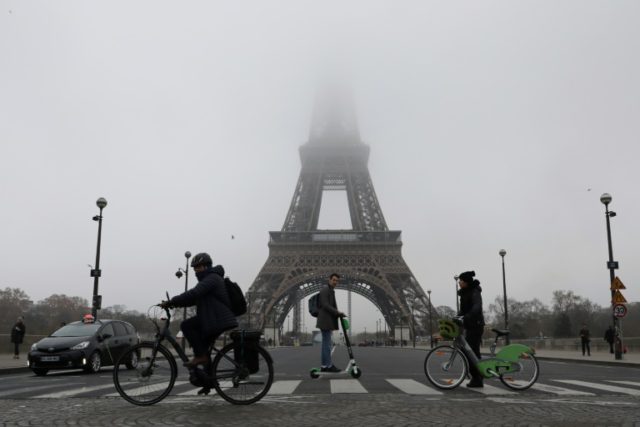Paris (AFP) – Arriving at a deserted Saint-Lazare station in Paris from his night job at a wholesale food market south of the city, Armand Kouakou makes his way wearily towards the departures board.
The 50-year-old butcher usually manages to catch a train for the Paris suburb of Etang-la-Ville within 15 minutes.
But on Thursday, the first day of a national strike which slammed the brakes on public transport, Kouakou, who already spent an hour and a half trying to get home, will have to wait another hour.
And yet he is loath to condemn the transport workers who walked off the job en masse over reforms aimed at bringing their generous pension schemes in line with those of private-sector workers.
“In order to get something you have to demonstrate,” he said, while admitting: “At a personal level it’s annoying.”
Kouakou was one of the rare passengers on the move in the normally bustling station, a hub for trains arriving from Normandy, all of which were cancelled.
Across Paris, the streets were noticeably quiet, with many employees working from home to avoid being stranded by the shutdown of much of the city’s metro, bus and tram services.
With over half of all primary teachers and 42 percent of secondary teachers on strike many schools were shut, forcing affected parents to either stay home or fork out for babysitters or nannies.
Moly Zamora, a mother of three working in the creative department of a major advertising agency, was among those working from home Thursday.
Zamora counted herself among the lucky ones because her boss “doesn’t care where we work from”.
But she fears huge headaches for the agency if the strike drags on, forcing the cancellation of planned advertising shoots.
“If the agency misses a deadline to deliver an ad, it has to pay for the broadcast slot,” she said.
– Rose-tinted glasses –
In a sign of the dearth of people on the move, traffic in Paris flowed more smoothly than usual.
Many of those who braved the strike resorted to bicycles, electric scooters or their own two feet to get about, and suppliers of alternative modes of transport tried to cash in on the situation.
“See the strike through rose-tinted glasses!” read a large pink display for French ride-sharing platform Heetch installed outside a train station.
Pink was also the colour of Valentine Ramette’s bare legs after the 30-year-old architect ran seven kilometres (4.3 miles) in near-freezing temperatures to her job in western Paris.
Like all the company’s Paris-based employees, she was under orders to show up by 10 am or to take a day off.
“If I went on strike I’d get a warning,” she said, adding she believed there were “other ways of protesting than blocking the country”.
While most stores in the busy Opera shopping district appeared to have opened for business, many were understaffed.
Not that they were run off their feet.
After standing for two hours at his linen stall in Saint Lazare station, Arkoub El Hadi was preparing to call it a day.
In two hours he had sold two items worth 20 euros ($22), a tenth of his usual earnings on a typical midweek morning.
“With the rent I’m paying I’m losing big time,” he said.
– Eiffel Tower shut –
The strike also brought disappointment for tourists, with the Eiffel Tower and the Orsay museum shut because of staff shortages, and some wings of the Louvre and the Pompidou Centre were closed.
Lisa, a Canadian tourist, said what struck her most was the heavy police presence in the French capital.
Around 6,000 officers were deployed ahead of a demonstration later in Paris amid fears of rioting by radical “yellow vest” anti-government protesters who have backed the union-led action.
Numerous yellow vest demonstrations over the past year have ended in looting and destruction of property.
“We don’t see things like that in Canada,” Lisa said.

COMMENTS
Please let us know if you're having issues with commenting.